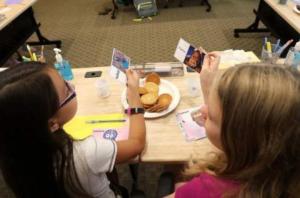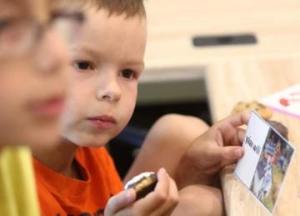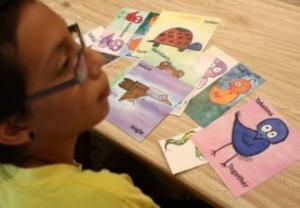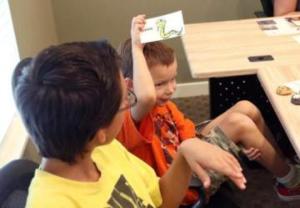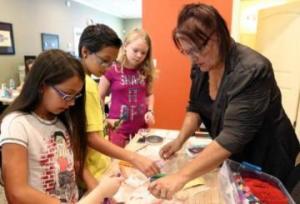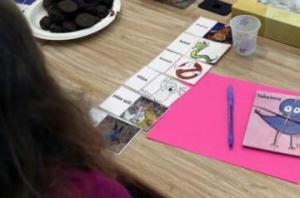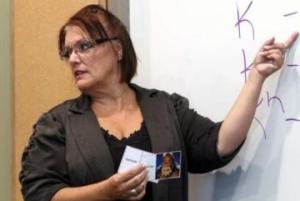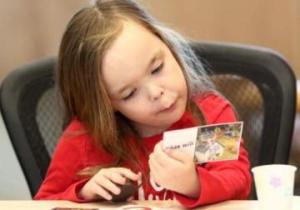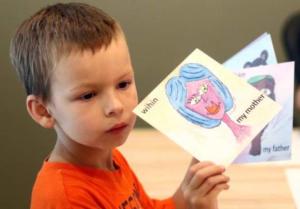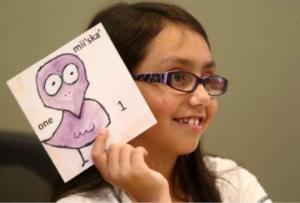 |
Canku Ota
|
 |
|
(Many Paths)
|
||
|
An Online Newsletter
Celebrating Native America
|
||
|
September 2015 - Volume
13 Number 9
|
||
|
|
||
|
Cow Creek Tribe Teaches
Itself To Speak Again
|
||
|
by Scott Greenstone
- The News-Review
|
||
|
credits: all photos by
Michael Sullivan - The News-Review
|
|
The flashcards in front of the children and the letters of the alphabet hanging on the walls made the classroom look similar to nearly every other language class. The creatures on the flashcards, however, were not dogs and tigers and elephants but mythic monsters and guardians. Intense-looking words with accents and apostrophes were splashed across the flashcards, and the letters on the walls were pronounced with unfamiliar sounds — "X," for instance, sounded like a cat's hiss. The students in Tri City were learning Takelma, the official language of the Cow Creek Tribe, which recently learned that the language had been preserved by the Smithsonian Institution. Takelma hadn't been spoken fluently in more than 75 years, and yet today the children of the Cow Creek Tribe are waking this dormant language up.
A Sleeping Language The Cow Creeks learned to blend in with the Western population, according to Michael Rondeau, CEO for the Cow Creeks. It wasn't hard for many of them — especially those who had intermarried with local trappers, had last names like Rondeau, Dumont and Pariseau, and looked white — but it meant they couldn't speak their native languages in public. They spoke Takelma, the language of a tribe they had close ties to and intermarriages with. The last known speaker of Takelma, a woman named Frances Johnson, or Gwísgwashãn in Takelma, died on the Siletz Reservation in 1934. For the rest of the century, tribal elders believed Takelma was just another casualty of white expansion, Rondeau said. It wasn't until four years ago that they learned the truth. In 2011, the tribe's natural resources director, Amy Amoroso, stumbled across a mention of Takelma surviving online. What she found on Google was a revelation. She relayed the discovery to the tribe's elders. Elder Joyce Sertain remembers crying, then getting goose bumps as she heard the story of her prodigal language.
A Linguistic Lottery The two spent a month and a half together at the Siletz Reservation where Johnson lived. The result was the basis of Sapir's doctoral dissertation: 276 pages of stories, medicine formulas and vocabulary. It's one of the few languages in the region to survive with so much content. "Out of the hundreds of little tribes, he picked ours," Rondeau said.
A Cultural Emergency This class takes place at the tribe's Myrtle Creek education lab. The teacher is Rhonda Malone, who is Cultural Development and Language Coordinator for the tribe, and recently she was determined to ensure that each of the children would walk away with a word he or she could say and define. To that end, she brought out candy. "It's amazing how well they knew these words when the Butterfingers came out," Malone said. "If they only learn one word, I don't care … not if that's the word that hooks them." Malone works hard to make these classes fun. Each one has a theme, like "Cookies, Creatures and Clay." But Malone and the elders are trying to teach a language they're still learning. Malone calls herself a Takelma 3-year-old. She knows vocabulary and strings sentences together, but doesn't yet understand the grammar. Malone also spends a lot of her time "harassing" the kids' parents to bring them to the classes, which are voluntary and not part of any school district's curriculum. Malone has to remind herself that the kids' parents have lives and jobs. "It's my big emergency," Malone said. "It's not necessarily their emergency."
A Long Road Ahead "When you have a smaller community," Goddard said, "they don't realize these people are the last store of knowledge until it's too late." Malone and the elders find ways to insert Takelma into everyday Cow Creek life, whether it's posting words on Facebook or just introducing themselves in their native tongue. Malone's vision is that one day she will be sitting with members of the tribe and a whole conversation take place without need for a single word of English. Her goal will be hard to attain. Dr. David Lewis, an anthropologist and ethnographer, said that for a language to survive, it has to have a purpose. If people don't need to speak it, they won't. Malone doesn't believe she will ever see Takelma spoken as fluently as she wants it to be, since if that goal is reached, it will occur many generations in the future. But this fact doesn't bother Malone. The privilege of learning right now is enough. "When we speak our language," Malone said, "we hear our ancestors' voices."
Cow
Creek Band of Umpqua Tribe of Indians |
|||||||||||||||||||||||||||||||||||
|
|
|
|
||
|
|
||
| Canku Ota is a free Newsletter celebrating Native America, its traditions and accomplishments . We do not provide subscriber or visitor names to anyone. Some articles presented in Canku Ota may contain copyright material. We have received appropriate permissions for republishing any articles. Material appearing here is distributed without profit or monetary gain to those who have expressed an interest. This is in accordance with Title 17 U.S.C. Section 107. | ||
|
Canku Ota is a copyright ©
2000 - 2015 of Vicki Williams Barry and Paul Barry.
|
||
 |
 |
|
|
The "Canku
Ota - A Newsletter Celebrating Native America" web site and
its design is the
|
||
|
Copyright ©
1999 - 2015 of Paul C. Barry.
|
||
|
All Rights Reserved.
|
||
